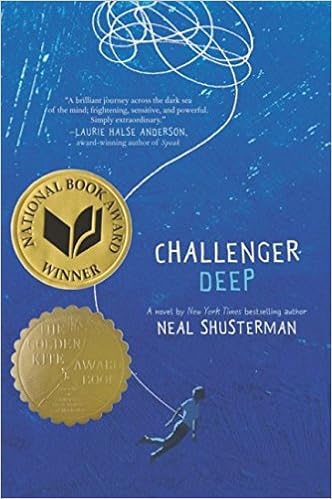DEAR EVAN HANSEN: the book, the Broadway play (and why I kind of hate them both.)

Brace yourself. I realize I'm in the minority here, but I am not a fan of the popular musical-- and now YA novel Dear Evan Hansen.
If Dear Evan Hansen the novel came first, I don't believe it would ever have been published-- or if it was, it wouldn't be met with great acclaim. I'll try to explain why, but first, let's talk about the original source material: the play.
It's been hard for me to explain what bothers me so much about the play. I saw it with the original cast on Broadway and it was indeed powerful, particularly in its use of technology and the set designed to showcase the viral note that took on a life of its own. It was an original and visually appealing way, I thought, to explore social media's power, particularly among teens. I also liked the music (it was no Hamilton, but really, what is? Thank you, Lin-Manuel Miranda, for ruining all other musicals for me. But I digress...), the performances were all solid, etc. etc. but something left me both unsettled and unexpectedly angry. What was it?
During the intermission I tried to articulate it to my friend who had traveled to NYC to see it with me. Was my discomfort around the characterization of Evan Hansen's mental health? Maybe. I had read several sources that suggested Evan was likely a character with Asperger's or some other high functioning form of autism. If so, I didn't think they did a great job conveying anything other than Evan's anxiety -- mostly in Ben Platt's twitches and mannerisms and the way his mom continually asked him how he was doing on refills for his medication.
If you've read this blog before, you know that my Teenager has Aspergers (and a whole bunch of other challenges, like anxiety and OCD), and my Tween has severe anxiety and depression. I'm a little bit of an expert on Asperger's and anxiety. And I was offended at the title character's undefined, "Asperger's-like" mental illness.
Asperger's isn't an excuse for bad behavior. Or for a lack of accountability. Or for not having the conviction of character to own up to your mistakes. To learn anything from them. Evan's autism (like most of the other elements of his behavior and personality), isn't developed. It's offered in broad brush strokes, or worse, as a manipulative strategy to get audiences to empathize with lonely Evan. So I thought, well crap. That sucks. But this problem plagues portrayals of autism everywhere in our culture. Sure, it's a bummer, but ususally it doesn't piss me off quite so much. There must be something else at work here.
Maybe it's the show's treatment of mental health in general, which is half-hearted at best. YOU WILL BE FOUND is the show's tagline, a message is intended to do something we as a society desperately need: to let teens struggling depression and other mental illness know they don't have to suffer alone. To encourage them to get help and provide avenues to do so. To let people, teens especially, see themselves on stage (or in a book - more on that in a minute) and feel seen and understood. These are all crucial, a worthy centerpiece to a successful show.
Yet at same time, the character who commits suicide, Connor, isn't the point of the story. Evan Hansen is.
And Connor, by all accounts, wasn't a terrific guy. His own sister hated him, and comes right out and says so in the wake of his suicide (a line that made me gasp out loud at the questionable motive of the writers in that moment). Very little stage time is given to creating empathy for Connor's depression-- all that empathy is saved for Evan. And maybe for Connor's family, who so clearly want a do-over with their son. As a result, one unfortunate takeaway is that suicide can lead to popularity-- kind of like the classic Heathers, but not as dark, smart, or ironic. If "you are not alone" is the idea, then why is this show is populated by an entire cast of characters who are all alone, and remain so despite being surrounded by social media? If that were the message-- that social media is isolating us all more than ever-- I'd applaud. But it doesn't seem to be. It's too muddy.
Even more problematic, though, is Evan. I'll just say it:
Evan Hansen is kind of an asshole.
Sure, his whole debacle starts out innocently enough with a well-meaning therapist's suggestion that Evan write a letter to himself being mistaken for Connor's suicide note. It makes sense that Evan doesn't know what to do in the moment, in the face of grieving parents so clearly grasping for any understanding of the loss of their son.
But Evan makes terrible choice after terrible choice. In the end, I really hoped there would be real fallout from his lies, or at least some character growth or sense of responsibility in Evan's. There isn't. It's unsatisfying. It's also super-problematic, this idea that he gets a free pass because of his mental illness. That anyone does.
"Jeez," a friend said after my initial tirade, trying not roll her eyes. "It's just a musical. Perhaps you're overthinking it."
Fair point.
So when I was sent the NOVEL to review, I was intrigued. Hopeful. Here it was: a chance for the show's creators to delve more deeply into the characters, to do a more nuanced approach to mental health. To actually make me care about Evan. In short, to redeem itself.
Obviously, as the title of this post proclaims (as I'm sure, if you're still with me here you've realized by now), the novel is just as bad as the show at these goals. One thing I'd say it does well: it clearly identifies that Evan suffers from anxiety, not Asperger's. Outstanding, I can get off my soapbox about that now. Apparently that was simply mischaracterized in the initial reviews of the show, and repeated.
But Evan's anxiety, like Connor's depression, is acknowledged rather than probed. In fact, the book makes a pretty solid connection between Evan's anxiety and his bad behavior -- both problematic and dangerous to one's understanding of mental illness -- particularly when he just stops taking his medication and seems to feel better as a result (until he doesn't). Like SNL's Pete Davidson so aptly said, "mental illness is not an excuse for bad behavior." Thus, instead of refuting my post Broadway production rant, the young adult novel succeeds only in underscoring it.
In fact, had the book come before the play any good agent or editor would likely have counseled the authors that:
A) Evan needs to have some agency rather than just get carried along through life, making no decisions of his own and
B) to read some of the many excellent YA titles out there that more effectively tell stories about suicide, anxiety, and even the eponymous power of the internet, or
C) perhaps they should write some catchy songs, create a cool tech-savvy set, and market the story as, oh, say, a musical, where it could get away with its problems because many theater goers don't over-analyze the story (ahem). Really, one can be expected to do only so much in 2 hours.
Books matter. Stories matter. Mental health absolutely matters. Thoughtful and accurate representation of mental illness REALLY matters. And taking one's prescription medication for said mental health can be the difference between life and death, and you can't just stop one day without potentially dire consequences.
Moreover, stories resonate when they feel true, not manufactured to loosely string together a group of mostly only just-okay songs.*

So don't pick up Dear Evan Hansen: the novel. Instead, read Neal Shusterman's CHALLENGER DEEP or Sally J. Pla's STANLEY WILL PROBABLY BE FINE

for compelling and empathic depictions of anxiety. Read the always brilliant A.S. King's GLORY O'BRIEN'S HISTORY OF THE FUTURE, Margaret Mahy's 24 HOURS, or Julie Anne Peters' BY THE TIME YOU READ THIS, I'LL BE DEAD for unique and

poignant stories that touch upon suicide, loss, and human fragility. Read John M. Cusick's GIRL PARTS for a surprisingly funny tale of the search for meaningful connection in our increasingly connected world.
And finally, if you struggle with mental health, please keep reading.
Keep searching for yourself in books.
And I promise, you will be found.
*except, of course for the song "You Will Be Found," which is lovely. And even better when Ben Platt and Lin Manuel Miranda do a mash-up with Hamilton's "Tonight," which straight up rocks.
